“Dubai is sometimes called the “City of Gold” because of its stunning growth from a sleepy Gulf port to a world-famous business crossroads in the space of a single generation. Its nickname has a literal meaning for traders in the precious metal. The city is building itself up as a center for the gold trade, between sources in Africa and consumers in the rising economies of China and India.
Dubai's tax-free status has made it one of the cheapest places to buy gold in the world. The emirate has set up gold refineries and vaults and jewelry-making facilities, importing gold – including scrap from India – and melting it down to produce gold bars. At the Dubai Gold and Commodities Exchange, traders and speculators buy and sell the metal on the futures market. Gold prices remained relatively steady in 2012, close to $1,700 an ounce.
The city has also become a retail center with 600 shops selling gold – half of them crammed into the gold souq, drawing tourists, traders and local residents”. – Kamran Jebreili via Associated Press
Dubai's tax-free status has made it one of the cheapest places to buy gold in the world. The emirate has set up gold refineries and vaults and jewelry-making facilities, importing gold – including scrap from India – and melting it down to produce gold bars. At the Dubai Gold and Commodities Exchange, traders and speculators buy and sell the metal on the futures market. Gold prices remained relatively steady in 2012, close to $1,700 an ounce.
The city has also become a retail center with 600 shops selling gold – half of them crammed into the gold souq, drawing tourists, traders and local residents”. – Kamran Jebreili via Associated Press
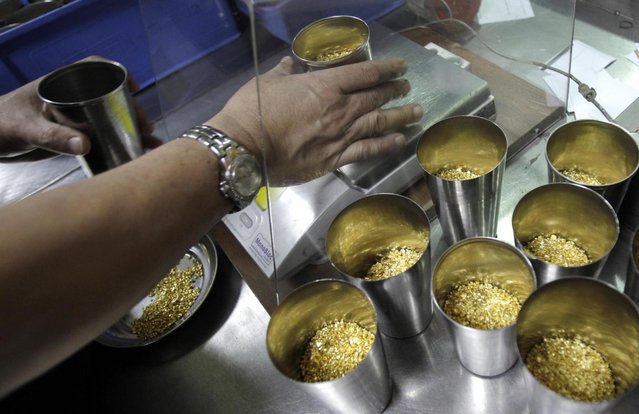
Technician prepares 1 Kg containers of gold grains for melting into 995.0 purity gold bars at the Emirates Gold refinery in Dubai, United Arab Emirates. Dubai now has about a 29 percent market share of global gold trade with nearly 1,200 tons – worth about $41 billion – changing hands annually in the city's gold markets, according to the gold industry website bullionstreet.com. At the Dubai Gold and Commodities Exchange, traders and speculators buy and sell the metal on the futures market. (Photo by Kamran Jebreili/AP Photo)

Steam rises from hot grains of gold after being melted and dropped into water as a technician pours the nuggets into a cooling container at the Emirates Gold company in Dubai, United Arab Emirates. One of the largest gold factory in the region, Emirates Gold has processed more than two million kg of gold, worth about 108 billion U.S. dollars, into gold bars, coins and medals since it was established in 1992, Mohamad Shakarchi, managing director of the company says. (Photo by Kamran Jebreili/AP Photo)
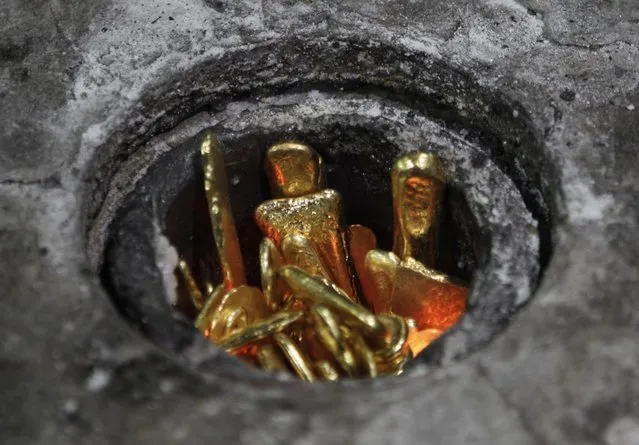
Scrap pieces of gold are placed into a furnace to be melted down at the Emirates Gold refinery in Dubai, United Arab Emirates. (Photo by Kamran Jebreili/AP Photo)
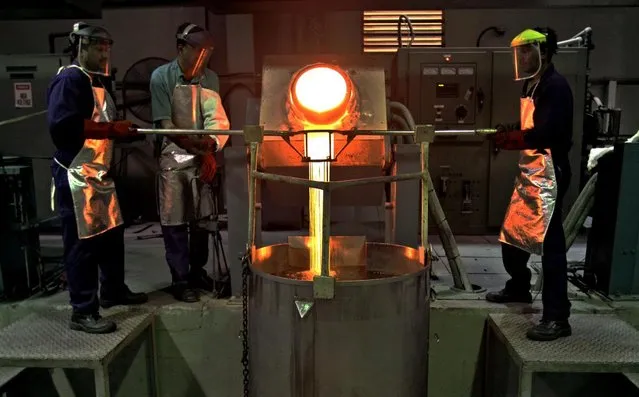
Strings of melted gold from a 350 kg gold bar drip into water during the smelting process at the Emirates Gold company in Dubai, United Arab Emirates. Dubai has set up gold refineries, vaults and jewelry-making facilities building building itself up as a center for the gold trade, between sources in Africa and consumers in the rising economies of China and India. (Photo by Kamran Jebreili/AP Photo)
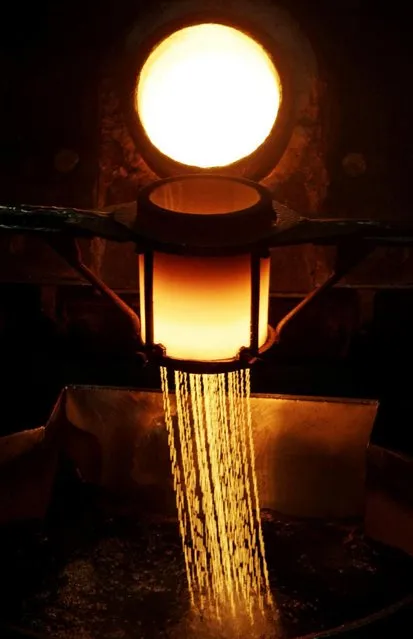
Strings of melted gold are pour into a water bath from a furnace with temperatures exceeding 1000 degrees centigrade at the Emirates Gold company in Dubai, United Arab Emirates. Dubai has set up gold refineries, vaults and jewelry-making facilities giving it a about a 29 percent market share of global gold trade. (Photo by Kamran Jebreili/AP Photo)
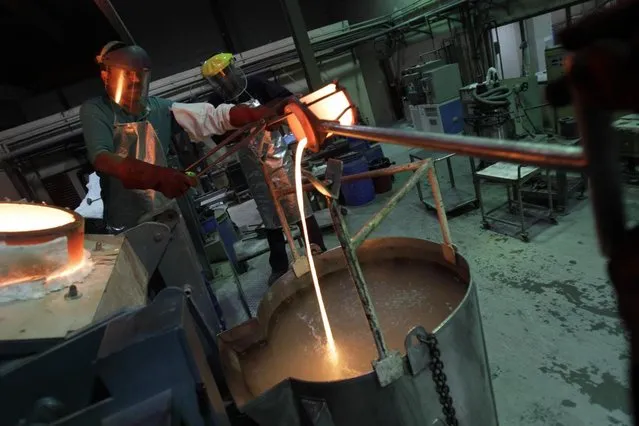
Strings of melted gold with a temperature of about 1050 degrees centigrade are poured into cooling water bath from a furnace at the Emirates Gold company in Dubai, United Arab Emirates. (Photo by Kamran Jebreili/AP Photo)
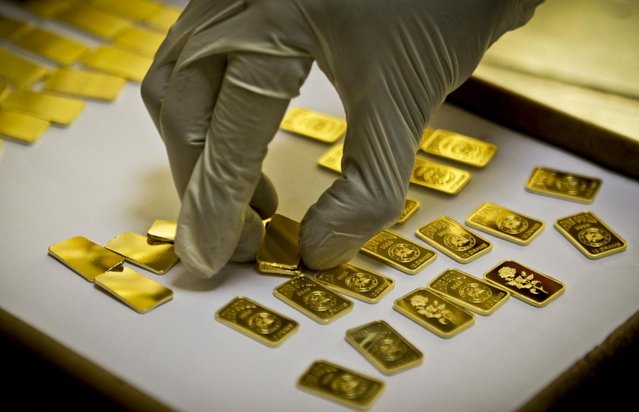
A gold press operator collects 10 gram gold blanks to press them with the logo of the Emirates Gold company in Dubai, United Arab Emirates. Gold prices remained relatively steady in 2012, close to $1,700 an ounce. (Photo by Kamran Jebreili/AP Photo)
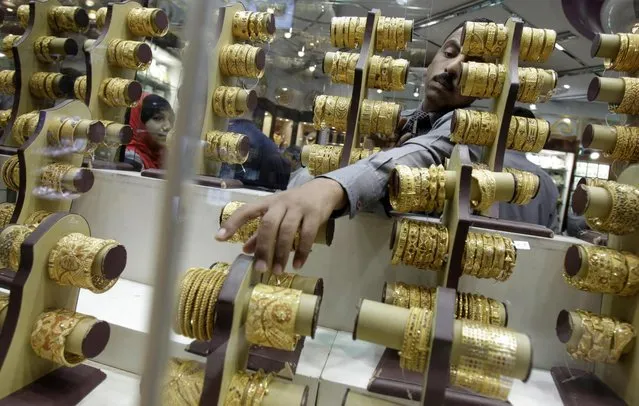
An Indian salesman collects a bangle to present to a customer at a jewelry shop in the gold suq in Dubai, United Arab Emirates. Dubai's tax-free status has made it one of the cheapest places in the world to buy gold and has also become a retail center with 600 shops selling gold – half of them crammed into the gold souq – drawing tourists, traders and local residents. (Photo by Kamran Jebreili/AP Photo)
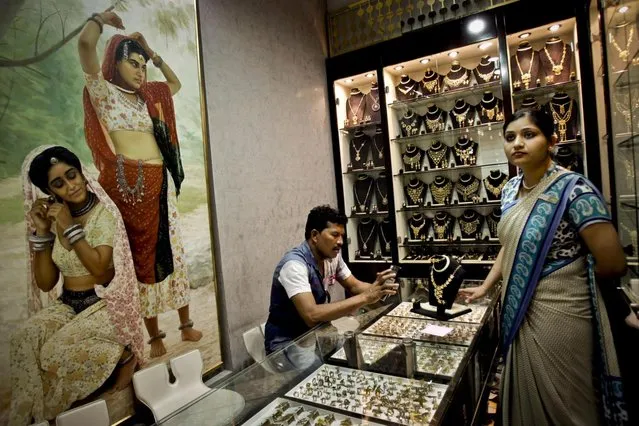
A customer uses his calculator to convert a jewelry price at a jewelry shop in the gold suq in Dubai, United Arab Emirates. (Photo by Kamran Jebreili/AP Photo)
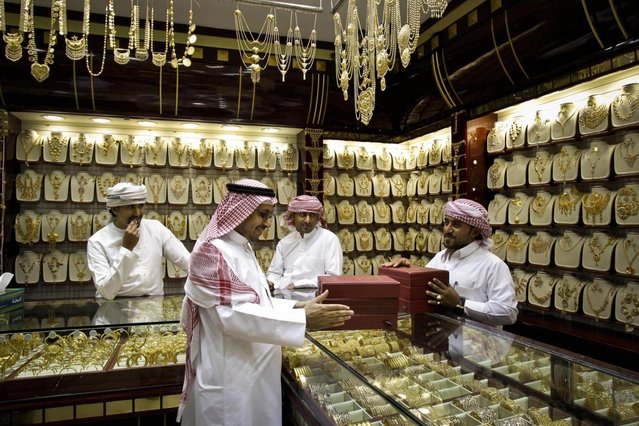
A Saudi customer discusses his purchases at a jewelry shop in the gold suq, or market, in Dubai, United Arab Emirates. The price of gold in Dubai is fixed daily and items are sold by weight. with little or no or little charge for the often exquisite workmanship. (Photo by Kamran Jebreili/AP Photo)
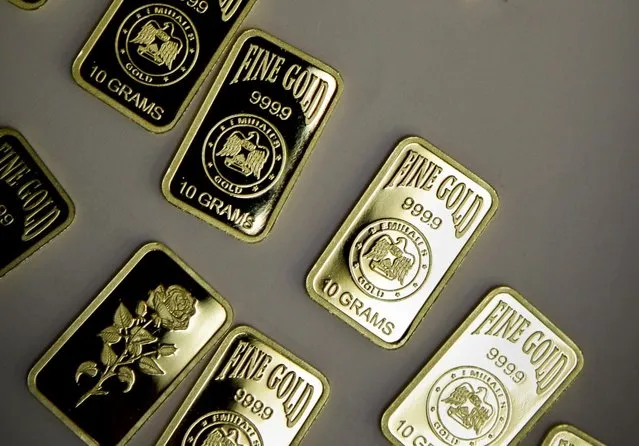
10 gram gold bars with a purity of 999.9 have been pressed and stamped with the «Emirates Gold» company logo in Dubai, United Arab Emirates. Dubai now has about a 29 percent market share of global gold trade with nearly 1,200 tons – worth about $41 billion – changing hands annually at the city's gold markets, according to the gold industry website bullionstreet.com. (Photo by Kamran Jebreili/AP Photo)
06 Jan 2013 12:38:00,
post received
0 comments
